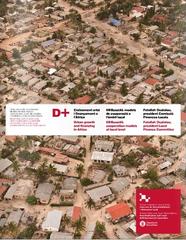D+ (Issue 5)

This issue of D+ focuses on the work done by local and regional authorities to engage with citizens and fight for increasing power for local-level engagement in advance of Habitat III (the 3rd UN Conference on Human Settlements).
It starts with a critical view of smart cities, and particularly the notion of “smart” as an individual, problem-solving capacity that usually only leads to high-quality infrastructure and services in places where they can be afforded. This is contrasted with the term “intelligent”, which can also apply to social organizations, forms of collaboration and cooperation. The author proposes an intelligent urban society, which means an inclusive city designed in participatory processes, inhabited by citizens, who engage with their political, economic, social, cultural and environmental rights and duties. Hence, the author calls for city authorities to put their citizens at the centre of concerns for city planning and management.
The key role of local authorities – particularly in medium-sized cities – in addressing global challenges is highlighted with examples from cities in Europe. The issue analyses strategic documents to tackle international relations as local public policy and outlines their common features as well as generally limiting factors.
The issue also examines the role of innovation and technologies and the role of the urban environment as a catalyst to improve technologies related to energy efficiency, mobility, households, etc., due to its high potential for creating collaborations, joint ventures, hub strategies, networks, innovation districts, platforms and living labs.
A chapter looks at the changes and challenges in governing the city of Guarulhos in Brazil, where poverty eradication has become the main focus and national legislation obliges the local government to spend a minimum of 15% of its budget on health and 25% on education. This increases the dependency of the local level on the national level for other projects, which is analysed in the case of wastewater treatment, where the majority of investments became available due to partnerships between the provincial authority and the central government.
The issue also features an interview with Bruce Katz, who calls for promoting economic growth in a way that is inclusive, productive and resilient and points out that city and metropolitan leaders need to face larger responsibilities now.
Available at http://www.uclg-decentralisation.org/sites/default/files/D%2B7%20_CA-EN_WEB.pdf
Book note prepared by Julia Wesely
Search the Book notes database
Our Book notes database contains details and summaries of all the publications included in Book notes since 1993 - with details on how to obtain/download.
Use the search form above, or visit the Book notes landing page for more options and latest content.
For a searchable database for papers in Environment and Urbanization, go to http://eau.sagepub.com/

